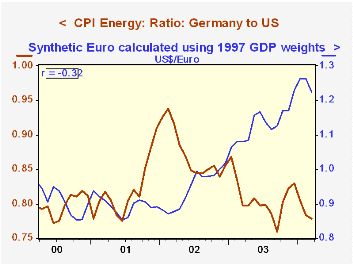 Global| Apr 14 2004
Global| Apr 14 2004Strong Euro Reduces Energy Impact on European Inflation
Summary
In addition to the US, a cluster of countries reported March CPI data today. For most, there was little movement in overall inflation on a year-to-year basis. Rates were steady between February and March, as in Italy, where divergent [...]

The steeply falling dollar must surely be a major cause of this divergence, since the world prices of crude oil and refined products are quoted in dollars. The chart above illustrates this impact. The right-hand scale shows the strengthening Euro. The left-hand scale shows a ratio of the energy component in the German CPI to that in the US data. As the euro has risen, this ratio has fallen markedly. And in fact, energy prices in Germany have actually been lower than a year ago in the last three months. It's not just that there's been less inflation in the energy sector in Germany, but price levels have fallen outright. The same situation exists in France. However, the dollar began to firm in March, so perhaps this seeming anomaly of oil that is simultaneously more expensive and cheaper will dissipate.
| 12-mo % Changes | Mar | Feb | Jan | 2003 | 2002 | 2001 |
|---|---|---|---|---|---|---|
| US | 1.7 | 1.7 | 1.9 | 1.9 | 2.4 | 1.6 |
| Ex Energy | 1.8 | 1.5 | 1.5 | 1.5 | 1.9 | 2.7 |
| Euro Exchange Rate (avg.) | 1.2261 | 1.2640 | 1.2638 | 1.1317 | 0.9453 | 0.8955 |
| Germany | 1.1 | 0.9 | 1.2 | 1.1 | 1.2 | 1.6 |
| Ex Energy | 1.4 | 1.2 | 1.3 | 0.8 | 1.1 | 1.9 |
| France | 1.7 | 1.8 | 2.0 | 2.2 | 2.3 | 2.4 |
| Ex Energy | 2.1 | 2.1 | 2.2 | 2.4 | 2.1 | 2.2 |
| Italy | 2.3 | 2.3 | 2.2 | 2.5 | 2.8 | 2.4 |
| Sweden | -0.1 | -0.4 | 0.7 | 1.3 | 2.1 | 2.7 |
| Underlying Inflation Rate | 0.4 | 0.1 | 1.1 | 1.7 | 2.2 | 3.4 |
Carol Stone, CBE
AuthorMore in Author Profile »Carol Stone, CBE came to Haver Analytics in 2003 following more than 35 years as a financial market economist at major Wall Street financial institutions, most especially Merrill Lynch and Nomura Securities. She had broad experience in analysis and forecasting of flow-of-funds accounts, the federal budget and Federal Reserve operations. At Nomura Securities, among other duties, she developed various indicator forecasting tools and edited a daily global publication produced in London and New York for readers in Tokyo. At Haver Analytics, Carol was a member of the Research Department, aiding database managers with research and documentation efforts, as well as posting commentary on select economic reports. In addition, she conducted Ways-of-the-World, a blog on economic issues for an Episcopal-Church-affiliated website, The Geranium Farm. During her career, Carol served as an officer of the Money Marketeers and the Downtown Economists Club. She had a PhD from NYU's Stern School of Business. She lived in Brooklyn, New York, and had a weekend home on Long Island.
More Economy in Brief
 Global| Feb 05 2026
Global| Feb 05 2026Charts of the Week: Balanced Policy, Resilient Data and AI Narratives
by:Andrew Cates





